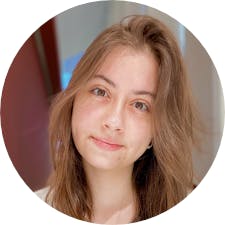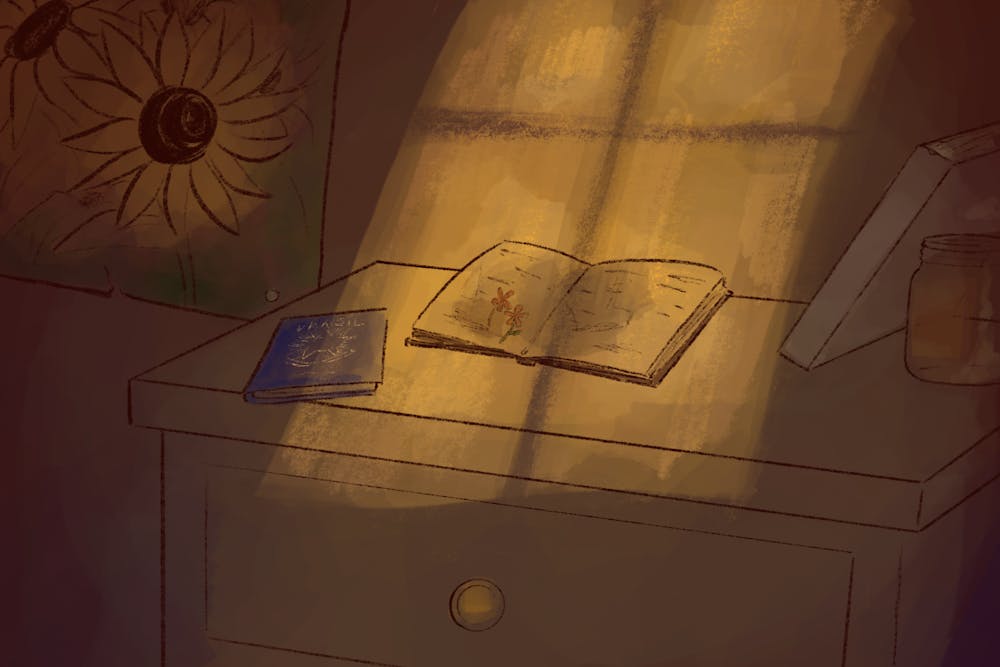I have heard that people exercise control to avoid pain. If you can rationally list the changes in your life, then sadness might seem like just one more item to check off and move on; isn’t that a nice thought? Walking around the house, I notice the out-of-place pieces that announce, even if there are still months to go, my leaving for University: the coat bought specifically for Providence's cold, the waiting suitcases, the pile of documents on the table. Watching those details accumulate, my chest tightens, and I feel the need to give objectivity a try; anything to make it hurt less. I’ve never been a scientist, but there is a calmness and certainty to their ways that seems inviting—especially at this moment, when I see myself faced with the unfamiliar. Afraid of leaving anything behind, I search for the tangible details of my current existence to be catalogued. I break down the bewildering whole in puzzle pieces. Letting my mind touch rather than think, I survey every object for memories. My method is already faulty, I notice. Scientists should first gather the data and then make conclusions, but I only collect what would sound nice on my lips if I were to describe it in years to come. There is no logic behind my inventory, just emotion. My process relies solely on feelings. I should clarify—they’re feelings I don't have names for. But isn't feeling a consciousness in itself? A way of perceiving the world beyond facts and numbers? A way of descending into the dark marrow inaccessible to language? Is this too poetic? Well, poetry is also a science, with all its line breaks, white spaces, and catalog of existences. Maybe I got a little off topic here. My mind keeps skipping thoughts like stones. I can hear the scientific community getting ready to leave—but wait a second. I can fix it.
ITEM01: Paper. Text written in black pen. Cellulose. Ink. Something Else. The writer makes excuses for her imperfect work. Offends scientists.
See?
ITEM02: Pressed flowers. Brownish-pink. Two-thumbs-side-by-side-sized.
My inventory project began in May, all because of a tree. I was sitting in my backyard reading the last chapters of Never Let Me Go. Yes, I guess I was emotionally vulnerable. Thinking about death and life and memory, and how sometimes I wish I had taken more risks in my life, and the sense of independence brought forth by discussing relationships with your friends over lunch break—and then the last line came and went. One more title for the shelf. The best books, when you finish them, make you want to stare at something. So I looked up, and there it was: the tree, staring back at me with its gravity-defying branches stretching themselves towards the sky. And it was so amazing to have a tree as witness; it was like I had read every word out loud and we now shared a secret. It wasn't the first time this had happened. After all, when I think of home, this is the tree that comes to mind, as if I am one of its pink flowers and not just a benevolent worshipper. It was the first time I knew I was leaving it, though. One year from now, I would be on a college campus, finishing my first year and enjoying a shining spring while the leaves of my tree dried and fell. The only way to stare at it would be through a screen. Between us rested the weight of final moments, that energy you feel before a wave hits. Change, for the first time in my life, was coming to fetch me. I wished I could cut myself in half and count my growth rings. Trace them with my fingers, feel all the ripples of my years until now. I drew it on the final page, above 282, under I just waited a bit, then turned back to the car, to drive off to wherever it was I was supposed to be. A book is easier to carry off to University. Is it strange to ask a tree if it will miss you?
ITEM03: Sunlight on Wooden Dresser. Honey-sweet. Coffee-smelling. Chamomile-tea-looking.
I can never find a balance. I am afraid of what was and what is to come. I am afraid of messing up my future with my past. I am afraid of staining my past with my future. Will the four-years-later version of myself be unrecognizable? Will it be so unchanged as to seem like a failure? I keep running after deathbed answers, moments of spiritual realization special enough to calmly free a soul of its body. When I look at sunlight on wood, I think I find them. It has something to do with the untraceable nature of the rays. The sun is millions of miles away, but it is also on my dresser: Little Miracle. “You are a deeply religious man who doesn’t believe in God.” I just pray that the people I love will look at the sunlight and think of me: miles away, but also here. I know I will think of them.
ITEM04: Poster. Farm Garden with Sunflowers. Faded. Packable.
Brazilian households are synesthetic. They like piling up sounds, touches, and smells. You will never hear louder laughter or have tighter hugs. Brazilian households are an experiment in entanglement, on how separate existences can become one single, indivisible garden with hearts grown together like ivy. These homes teach you that life is more than the sum of its parts, but rather what each part becomes. Life is a collection of brushstrokes. When I sit on my stairs and look at the painting on the wall, I think about the comfort of having a place you have to lose yourself into to feel found. “Where does such tenderness come from?” I know it will come from here, from the warmth of the earth I carry in my bones. It will be nature moving towards light. I will trace every love back to these roots.
ITEM05: Pool water. Chlorine. A leaf or two. Living beings.
I have been reading books in the pool. I used to be too scared of damaging them. Breaking spines, annotating, dog-ear-ing: It all seemed sacrilegious. But I don't think like that anymore. Maybe because I don't want to see my books the same way I see my phone, but also because I am human and the desire to leave marks can be very insistent. I want someone somewhere sometime to know that my handwriting was a mix of cursive and print. That I wanted to punch Vronsky, and that Woolf's prose made me feel like floating in the ocean, or that I, too, feared Loneliness to be the Maker of the Soul. So, now I take books to the pool, let them have a look at the sun, and smell the sunscreen. I hope they will absorb it all, so that when I open them again, I can read myself in the in-betweens. Nowadays, I have the urge to do the same thing with the walls.
ITEM06: Passport. Bad photo. Dusty.
I have been teetering around the center. Should I just be blunt? I will miss it all. I will miss it so much I will grieve it, from denial to acceptance. I guess my project—taking stock of my memories, putting every moment under a microscope—was doomed from the start; I am too sentimental for science. My thoughts are a collection of unresolved contradictions. Here goes one more: The sadness I feel while waving at my childhood grew from its insurmountable happiness. My childhood was the only reality I knew, and now it is the echoes of my sentences and movements. How to catalogue what can only exist in white spaces and line breaks? I told you poetry was a science.

Julia Vaz was the managing editor of newsroom and vice president on The Herald's 134th Editorial Board. Previously, she covered environment and crime & justice as a Metro editor. A concentrator in political science and modern culture and media, she loves watching Twilight (as a comedy) and casually dropping the fact she is from Brazil.





